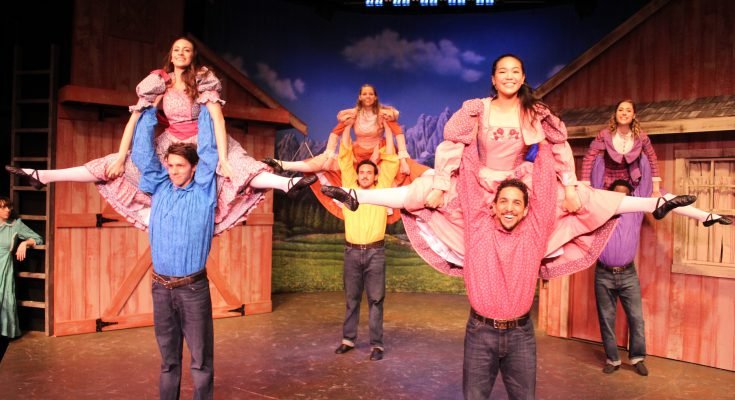When the Lyceum Theatre announced the plays for its upcoming season, I was a bit shocked that “Seven Brides for Seven Brothers” was included on the list. I did not know a great deal about the play, but I had heard a thing or two, including outright assertions that I would not enjoy it. When the time came to see it, I was concerned as to why a department that is so conscious of its messages concerning sexism and society would chose a play whose themes are questionable at best.
Despite my scruples, I entered the Lyceum Theatre opening night ready with the hopes of redemption. When the lights went down, the extravagant dance numbers and incredible voices kept my head spinning and heart turning as the audience enters the world of backwoods, 1850s Oregon territory.
The musical follows the endeavor of Adam Pontipee, played by freshman Robert Ball, in his attempt to find a wife to tend to his homestead along with his six brothers. Ball, who has shone on stage as a character actor, shocked me with his mature and believable portrayal of Pontipee. He managed to turn crude humor and crass lifestyle into a loveable, though flawed, character with the audience rooting for him to return to his senses.
It was obvious that certain plot points could make modern audiences cringe (as the original movie aired in 1954), but the actors handled it with knowing humor, laughing at the ridiculous standards suggested by certain character.
Leading alongside Ball was junior Megan Fox as Milly, the townswoman and cook Pontipee chooses to be his wife. Fox’s voice never failed to amaze as it carried throughout the show whether in times of love, heartache, or joy. But more important was how her petite frame dominated the stage, intimidating the male figures attempting to belittle her.
Fox and Ball were supported on stage by junior Andreas Schmidt (as brother Benjamin), freshman Erick Paul (as brother Frank), freshman Ashley Basset (as Dorcas), and a dozen others. In a cast of 23 people, the women were able to maintain a balance of silly and strong, and the men projecting both reckless and remorseful actions throughout the play.
And the action simply never stops. So you must pay attention if you don’t want to miss a moment of brother Daniel (played by sophomore Cameron Burchard) and brother Ephriam (played by sophomore Ethan Boyle) and their fun, identical shenanigans. And you simply must appreciate the complimentary—and equally hilarious—reactions of their love interests Liza (junior Alison Bassett) and Martha (junior Gabrielle Incremona).
These frivolous actions of the ladies in town add to the lighthearted nature of the production, but the women are also sure to hold their men counterparts accountable. Inappropriate decisions by the brothers or the suitors are not accepted as normal but cause disapproval.
Though space is limited, the production yet again manages to make the most of the small, polygonal stage. With dance numbers sometimes requiring a dozen people present, it was only the exact maneuvers, clever choreography, and precise timing keep the audience mesmerized and the actors on their feet. Well, when they are supposed to be.
Complex numbers throw actors across the stage in somersaults, backflips and handsprings. Choreographer Bretlyn Schmitt-Lazaris outdid herself, intermingling dancing and fighting, under the guidance of director Vanda Eggington and combat instructor Richard Soto.
The intricacy of the dances were indisputable, and the fight scenes occasionally lacked force behind the punch. Serious moments were undermined when punches fight choreographer did land and slaps missed their marks. The audience will often understand the fabrication of physical violence, but its forgery should not be obvious.
Overall, these slip-ups did not take away from the overall impressiveness of singing acting, dancing, and brawling. Humor, emotion, giddiness, and apprehension all gushed from the audience in both acts. Somehow, a plot that should have been predictable and plain was brought to new life.
Adding to the minor characters were scene transitions written by Eggington. These were further able to add to the narrative of equality between suitors and ladies. She also noted in a post-show talk back that there were actors in minor roles who deserved more stage time. As for the audience’s sake, she wanted them to always have something to look at.
“I don’t like leaving people in the dark,” Eggington said.
This talk back cleared up a lot of questions I had entered with. Aside from my original concerns, I was confused to why a department short of men would choose a show that demanded an overwhelmingly male cast, trained to both sing and dance? In the end, they were able to muster up a last-minute brother (Christopher Aguirre, an APU freshman) and the show went on.
And, per usual, the director, cast, and crew all managed to turn everything on its head. Instead of a story following silly girls falling for brutish men, Eggington asserted a message of equality and partnership in marriage. As stated in the talk back, she “couldn’t change the text,” but decided “let’s put the women beside them, and not behind them.”
This one choice completely changed the dynamic of the production. Milly emerged as a reasonable and strong lead, receiving the empathy of the audience. Her fear-inspiring glare never fails to cause the brothers to react in comical ways, creating a fun balance between their physical strength and her mental assertion.
The true remorse and earnest nature of the brothers improved the plot. The suitors were not unrightfully scorned lovers, but depicted as entitled and ill-mannered. This made the new politeness of the brothers reasonably attractive to the ladies (rather than relying simply on their good looks).
With this change, “Seven Brides for Seven Brothers” becomes nothing less than a night of fun, laughter, and flips. No, seriously, try and count how many flips there are in this show. The cast went all out in showing off the immense physical talent of these actors, whether it be freshman Noelle Roth (portraying Alice) and her precise twirls or junior Cornelius Lindsey (as brother Caleb) and his never-ending tumbles.
Perhaps peculiar to choose at first, the production did indeed maintain the high expectations I have for productions at Vanguard. I may have deemed it unwise at first, but the show proved once again that with the proper mindset and dedication, almost anything can be redeemed.

 The Addams Family: A Must See Musical
The Addams Family: A Must See Musical Vanguard Theatre Spring Productions
Vanguard Theatre Spring Productions Penniless pirates steal their way into audience hearts
Penniless pirates steal their way into audience hearts
Leave a Reply